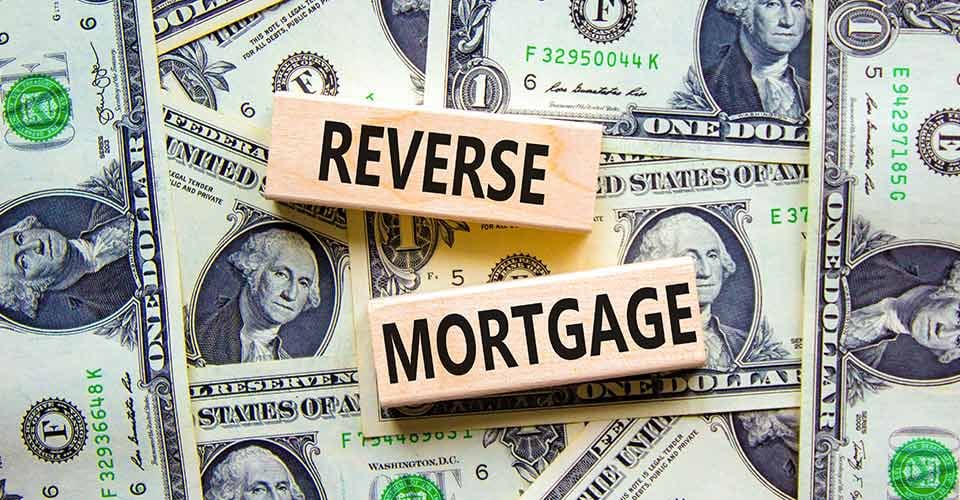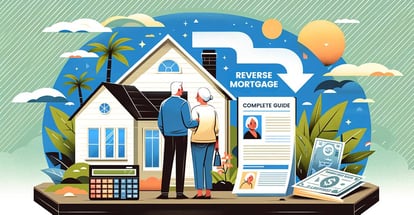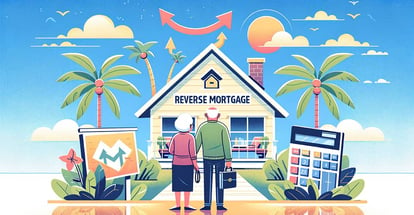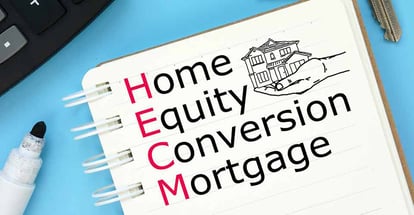Do You Ever Have to Pay Back a Reverse Mortgage?
Retirement marks the end of a lifelong career and a chance to take a well-deserved rest, yet it can also put a strain on your finances. In order to maintain a comfortable lifestyle during retirement, you may require anywhere from 70% to 90% of your previous income, but this may not always be feasible.
Are you considering the option to get a reverse mortgage? As with any big financial decision, it's important for you to understand all of your options and what is involved in this process.
The concept of a reverse mortgage has been around for decades now, but many homeowners or potential homeowners may still be asking questions like "Do I have to pay back a reverse mortgage?"
In this post, we'll take a deep dive into how these mortgages work so that you can make an informed decision about whether one may be right for you.
How does a reverse mortgage work?
A traditional mortgage involves borrowing a sum of money to purchase a house and subsequently repaying the loan through monthly mortgage payments.
This process typically lasts for 15 to 30 years, depending on the mortgage term, and involves making regular payments of principal and interest until the loan is paid off.
However, a reverse mortgage operates in reverse, providing an alternative way for older adults to access the equity in their homes.
Typically, a reverse mortgage is obtained on a property that you already own.
The lender then makes payments to you in the form of monthly installments, a lump sum, or through a line of credit. This can be a valuable source of income for retirees who may not have enough savings to support their lifestyle.
The amount of money you receive is determined by factors such as your age, the interest rate you qualify for, and the value of your home. The older you are, the more money you may be eligible to receive.
You don't have to make any payments as long as you live in the home. Instead, the loan balance accrues interest over time and is paid back when you sell the home or pass away.
This can provide financial flexibility for older adults who want to stay in their homes without worrying about making monthly mortgage payments.
It's essential to keep in mind that a reverse mortgage is a loan that leverages the equity in your property, which is the difference between the home's value and any remaining mortgage balance. This means that the loan balance can increase over time, reducing the equity you have in your home.
Additionally, reverse mortgages have specific eligibility requirements and fees that borrowers should consider before signing up.
How do you pay back a reverse mortgage?
A reverse mortgage usually does not require immediate repayment until you vacate the property or pass away.
At that time, you or your heirs must repay the borrowed amount along with the interest and fees accrued over time.
These expenses may comprise closing costs, origination fees, mortgage insurance premiums, and servicing fees.
Unlike a conventional mortgage, a reverse mortgage does not involve monthly payments for loan repayment. Instead, the entire sum is due in one lump sum.
Below are some of the most common methods of repaying a reverse mortgage.
Selling
The most prevalent method of repaying a reverse mortgage is by selling the property. After the sale, the funds obtained are utilized to pay off the loan.
The following are the situations you may encounter based on your home's value at the time of the sale:
-
If the home's value is higher than the outstanding loan balance - You or your heirs keep the excess amount after repaying the loan.
- If the home's value is less than the loan balance - You or your heirs will use the sale proceeds to repay a portion of the loan, while the mortgage insurance will cover the difference. You will not be required to repay more than 95% of the home's appraised value.
Refinancing
If you're a homeowner with a reverse mortgage and you don't want to sell your home, refinancing may be an option for you.
By refinancing, you can convert your reverse mortgage back into a traditional mortgage, provided that you have sufficient equity in the property and enough income to cover the monthly mortgage payments.
This is a great option to consider if you or your heirs want to keep the home.
Refinancing your reverse mortgage into a traditional mortgage can help you avoid having to sell your home to repay the reverse mortgage. It can also allow you to regain control of your home equity and monthly payments.
However, it's important to note that refinancing comes with its own set of costs and fees, so you'll need to weigh the pros and cons before making a decision.
Another option is to refinance into a new reverse mortgage. This may be a good choice if interest rates have dropped or if the value of your home has significantly increased.
A new reverse mortgage can provide you with access to additional equity, which can help you fund your retirement or cover unexpected expenses.
Deed in lieu of foreclosure
If you find yourself in a situation where you're unable to sell your home or refinance your reverse mortgage, there's still an option available to you.
It's called a "deed in lieu of foreclosure," and it involves transferring ownership of your home to the lender to satisfy the reverse mortgage.
This option can help you avoid the negative impact of a foreclosure proceeding on your credit score and allow you to exit the reverse mortgage agreement without additional expenses.
A deed in lieu of foreclosure may be a good option for you if the value of your home has plummeted, and it's now worth significantly less than what you owe on your reverse mortgage.
This can happen due to changes in the housing market, natural disasters, or other factors beyond your control.
By transferring ownership of the home to the lender, you can satisfy the reverse mortgage loan balance and avoid foreclosure proceedings.
However, it's important to keep in mind that this option may still have an impact on your credit score, so it's essential to explore all options before making a decision.
Paying off the loan with cash
If you're a homeowner with a reverse mortgage and you or your heirs have enough savings, you may be able to pay off the reverse mortgage loan balance with cash.
One advantage of a reverse mortgage is that the most you'll ever have to pay back is 95% of the home's value.
This means that even if the balance of your reverse mortgage has exceeded the value of your home, you or your heirs won't have to pay more than 95% of its current value.
Paying off your reverse mortgage with cash can be a good option if you want to avoid the costs associated with selling or refinancing your home.
It can also provide peace of mind knowing that you or your heirs won't have to worry about the reverse mortgage loan balance.
Another advantage of a reverse mortgage is that it can be paid back at any time. This means that if you or your heirs decide to pay off the loan balance early, there won't be any prepayment penalties or fees.

When do you have to pay back a reverse mortgage?
Reverse mortgage borrowers are generally not required to repay the loan as long as they continue to live in the home.
However, repayment of the loan becomes due when the homeowner passes away, sells the home, or moves out to live somewhere else, such as an assisted living facility. These are the most common situations where repayment is required.
If the reverse mortgage was taken out jointly with a spouse, the surviving spouse can continue to live in the home without having to repay the loan.
If the surviving spouse is not a co-borrower, they may still be eligible to stay in the home if they were married to the borrower at the time the reverse mortgage was obtained and meet other eligibility criteria.
In some cases, borrowers may be required to repay the loan or risk losing their home. This can happen if they default on property taxes, homeowner's insurance, or fail to keep up with necessary home repairs.
However, the mortgage servicer will ensure that borrowers are aware of the terms of the loan and the conditions under which they may need to repay the loan.
Types of reverse mortgages
There are three types of reverse mortgages available to homeowners, each with its own unique features and benefits.
The Home Equity Conversion Mortgage (HECM) is the most common type of reverse mortgage available. These loans are insured by the Federal Housing Administration (FHA) and can be used for any purpose. They are widely available from most lenders and offer flexibility in how the borrower receives the funds.
With an HECM, borrowers can choose to receive a lump sum payment, monthly payments, or a line of credit that can be drawn upon as needed.
Proprietary reverse mortgages are offered by private lenders and are designed for homeowners with very high home values. These loans may have higher borrowing limits than HECMs and may offer more flexible payment options.
Proprietary reverse mortgages are typically not insured by the FHA, which means that they are subject to more lender-specific requirements and may have higher costs.
Finally, single-purpose reverse mortgages are sponsored by state or local governments, or nonprofit organizations. These reverse mortgages are designed for a specific purpose, such as home repair or paying property taxes.
They may have lower borrowing limits than HECMs or proprietary reverse mortgages, but they can be a good option for homeowners with limited income or who need assistance with a particular expense.
How to qualify for a reverse mortgage
Qualifying for a reverse mortgage requires meeting specific criteria that vary by lender, but there are some general requirements that most borrowers must fulfill.
You must be aged 62 or older to qualify for a reverse mortgage. The loan is designed to help seniors access their home equity without having to sell their home or move out.
You must live in the home full-time as their primary residence. Reverse mortgages are not available for second homes or investment properties.
You must own their home free and clear or have only a small remaining mortgage. The lender will calculate how much equity is available in the home and use that value to determine the loan amount.
You must be up to date on all federal debts, including income taxes and student loans. Outstanding debts could affect a borrower's eligibility for a reverse mortgage.
Finally, you must have enough money to keep the home in good repair and pay property taxes and insurance. A portion of the reverse mortgage may be used for these purposes.
This requirement ensures that the home remains in good condition and can be sold or passed on to heirs without any financial burden.
Bottom Line
To sum it up, a reverse mortgage is an interesting way to add financial stability to your retirement plan. As long as the home is kept up with regular maintenance and taxes are paid, the loan will never be due. The best part of having a reverse mortgage is that you still own the home and enjoy living in it.
You also gain access to extra money if you need it while maintaining financial independence during your retirement years. It’s essential to speak with an experienced professional or elder lawyer before you start exploring your options regarding reverse mortgages.
They can help make sure that signing up for one of these loans won’t leave you in a complicated situation later on down the road.
Our team at MakeFloridaYourHome has extensive experience in helping buyers and homeowners secure reverse mortgage plans, so reach out and contact us today for more information!
With over 50 years of mortgage industry experience, we are here to help you achieve the American dream of owning a home. We strive to provide the best education before, during, and after you buy a home. Our advice is based on experience with Phil Ganz and Team closing over One billion dollars and helping countless families.

About Author - Phil Ganz
Phil Ganz has over 20+ years of experience in the residential financing space. With over a billion dollars of funded loans, Phil helps homebuyers configure the perfect mortgage plan. Whether it's your first home, a complex multiple-property purchase, or anything in between, Phil has the experience to help you achieve your goals.


 By
By  Edited by
Edited by 






